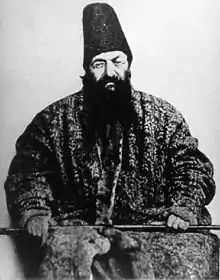Reza-Qoli Khan Hedayat
Reza-Qoli Khan Hedayat (Persian: رضاقلیخان هدایت; 8 June 1800 – 29 June 1871) was a Persian literary historian, administrator, and poet in 19th-century Qajar Iran.
Reza-Qoli Khan Hedayat | |
|---|---|
 Portrait of Reza-Qoli Khan Hedayat | |
| Ambassador of Iran to Khiva | |
| In office 1851 | |
| Personal details | |
| Born | 8 June 1800 Tehran, Qajar Iran |
| Died | 29 June 1871 Tehran, Qajar Iran |
| Parent(s) | Mohammad-Hadi Khan (father) |
| Relatives | Sadegh Hedayat (great-great grandson) |
Biography
Hedayat was born in Tehran on 8 June 1800 to a renowned family which was descended from the prominent 14th-century lyric-poet Kamal Khujandi. In his autobiographical work, Hedayat sometimes refers to himself as "Hedayat Mazan-darani", "Tabari", or "Tabarestani" due to his father Mohammad-Hadi Khan having served in the entourage of the Qajar tribal leaders in Mazandaran.[1] Upon the completion of his education, he entered the service of Prince Hossein Ali Mirza Farman Farma son of Fat'h Ali Shah and governor of Shiraz. He was given the title of Khan and of Amir-ol Sho'ara in 1830, when Fath Ali Shah visited Shiraz.
In 1838 he came back to Tehran. Mohammed Shah instructed him to remain at the court and in 1841 selected him as tutor to his son Prince Abbas Mirza Molk Ara. In 1847 he was appointed governor of Firuzkuh.
Mission to Khiva
In 1851, he was chosen by Naser al-Din Shah to lead the Embassy to Khiva. Relations between Iran and Khwarazm were at this time strained by mutual distrust, the Khan of Khiva having been accused of supporting the Salar Revolt and conducting raids on Northern Khorasan some years prior.[2]
He was minister of education in 1852 and principal of the newly founded Dar-ol-fonoon College at Tehran.
In 1857, he was selected as tutor of Mozaffar al-Din Shah.
He died from a severe illness in 1871. He has two sons, Ali Qoli Khan Mokhber ed-Dowleh and Ja'afar Qoli Khan Nayer-ol-Molk. Reza Qoli Khan was great-grandfather of Sadeq Hedayat.
Works
- Farhang-e anjomanārā-ye nāṣeri (a Persian dictionary)
- Madārej al-balāḡa dar ʿElm-e Badiʿ (on Persian rhetoric)
- Majmaʿ al-foṣaḥā ("The meeting place of the eloquent")
- Rawżat al-ṣafā-ye nāṣeri
- Riāż al-ʿārefin ("The gardens of the Mystics")
- Tārix-e Rawżat al-ṣafā-ye nāṣeri (on history)
He also wrote a Divan containing 50,000 distichs and six Mathnawis.
References
- Losensky 2003, pp. 119–121.
- Granmayeh, Ali (June 1996). "Sefarat Name‐ye Khwarezm—the last Iranian mission to Central Asia in the 19th century". Central Asian Survey. 15 (2): 233–253. doi:10.1080/02634939608400948. ISSN 0263-4937.
Sources
- Losensky, Paul E. (2003). "Hedayat, Reżāqoli Khan". In Yarshater, Ehsan (ed.). Encyclopædia Iranica, Volume XII/2: Hedāyat al-mota'allemin–Herat VII. London and New York: Routledge & Kegan Paul. pp. 119–121. ISBN 978-0-933273-75-7.